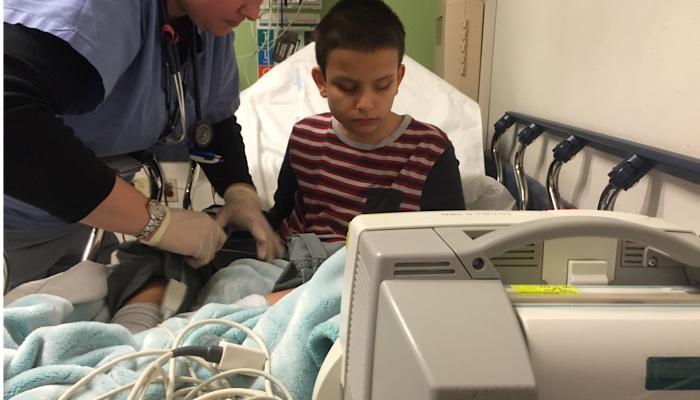What I wish people understood about raising a medically complex child

Here’s something I’ve learned in the last 10 years: Raising a special needs child is hard, but raising a special needs child who is medically complex is much harder. I know that sounds obvious, but you don’t really realize the difference until you live it.
The medications, equipment, doctor’s visits, sleepless nights, hospital stays – it all adds up into one big ball of stress.
Another thing I’ve learned is that people want to help, but they don’t know how. They want to say something to alleviate the stress or bring you relief in some way, but more often than not they actually make things worse. There are a lot of things I wish people understood about raising a medically complex child. This is my top five list…
#1 I really don’t need your advice.
I know people mean well, but unless you’re a medical professional or a family living through a similar experience, chances are pretty good that I already know more about my son’s condition than you do. Let’s face it, as the parent of a child with a serious medical condition, I’ve had to become an expert.
And yet, all we need is one seizure in public and suddenly every bystander thinks they have relevant information to add to the situation. Yes, I’m aware of the Ketogenic diet. Yes, I’ve heard of Cannabis oil. No, I’m not going to discuss my son’s treatment plan with a total stranger!
#2 Please don’t ask if things are “back to normal.”
When your child is dealing with a complex condition you’ll probably have quite a few scares, emergencies are part of your routine and you may end up in the hospital. You may end up in the hospital a lot actually. And you know what? THIS IS NORMAL. This is what life with a serious medical condition looks like.
So when we get out of the hospital and are back at home, please don’t ask if “everything is normal now.” The question implies that we’ve left all that pesky medical stuff behind us. Yes, life is back to normal – but normal is a very subjective word.

#3 Don’t bring up our illness during good times.
Another part of our normal is that we have happy times. We laugh and have fun when we can. Things can get crazy in the blink of an eye, but in between the emergencies we are living life the best we can. So why would you want to remind everyone about the bad times when we’re happy?
For example, when I post a cute picture of my son smiling on Facebook, please don’t reply with the macabre comment “Hope he feels better soon.” I’d prefer, “What a handsome young man he’s become!” Because (a) he’s probably not going to “feel better soon” and (b) I’d like to think our friends and family can see past his medical issues and just appreciate his smiling face now and then and (c) he really is a handsome young man!
#4 Don’t offer to help if you can’t.
This is a tough one. For some reason in our society the automatic response to someone being ill or having an emergency is to say, “Let me know if I can do anything” or my favorite “Don’t hesitate to call if you need anything!” Don’t hesitate – just do it!
But I do hesitate, and do you know why? Because 95% of these promises of help are provided with no intention of follow through. When I finally do collect my courage and ask for help… the answer is generally no (“I’m so sorry! I wish I could – I’m just so busy!”).
This may sound over the top, but it’s not an exaggeration to say that this is kind of soul crushing. If you can’t help, please don’t offer.

#5 Please include us.
We might not come or we may cancel last minute, but please invite us to your child’s birthday party or to tag along on an outing. Living with complex medical issues and the constant fear of an emergency is isolating. It also holds us back from doing a lot of the fun things we want to do. Which means what we need more than anything are GOOD FRIENDS and GOOD TIMES. If you can give us the chance at both, please do!

Related Posts

Eye Conditions and Syndromes, Visual Impairment
Neuralink Announces Plans to Restore Sight to the Blind with Brain Chip
Elon Musk’s company Neuralink has announced plans to begin human trials of its new “Blindsight” brain chip by the end of 2025.

Special Needs
5 Spring Cleaning Tips for Families of Children with Disabilities
Spring cleaning is an opportunity to create a more accessible, organized, and supportive space for your child with disabilities. Declutter, deep clean, and refresh!

Visual Impairment
The Gift of Understanding: How a Young Child Helps His Blind Father Navigate Life
When a parent is blind, it’s natural for people to wonder how their sighted child will adapt. Will they struggle to understand their parent’s needs? Will they feel burdened by...